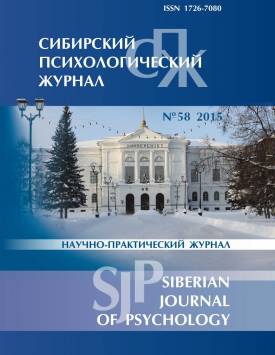Integral-value paradigm and biopsychosocionoetic model of human nature and health in the context of positive anthropological psychology
Since the 6-th Siberian psychological forum is dedicated to "paradigms dialogue", the author of this article, trying to engage into this dialogue, offers to consider an integrative paradigm option the key categories of which are integrity and value which is based on the biopsy-chosocionoetic model of human nature and health. Psychology and psychologists have always dreamed to "assemble a man" who was "disassembled" starting at the end of the nineteenth century and continuing in the 20th century by unilateral directions of researches on Pavlov's reflexology, Watson's Behaviorism, Freud's psychoanalysis, Adler's individual psychology. Frankl and Vygotsky pointed out that "artificial pulling of the whole psychological reality on any category leads a psychological thought to a dead-end." Rogovin mentioned: "as a result of the increasing differentiation of psychology it main subject - a man - is lost." The author agrees with those scientists who come to believe that spiritual (value and meaning) component of a person not only presents "a human nature in a man" but also acts as a decisive factor for "assembling" of a man into a unified whole. According to the metaphor suggested by the author [9-11] the essence of a man, his life, health and development is expressed in the perpetual motion in the worlds and spaces named above worlds in time from irdic (earthly, bodily) to noetic (spiritual, values-semantic): to human ideals, higher feelings, aesthetic, religious, intellectual, moral values, love, self-cognition, creativity, freedom, spiritual health, and back. Measure of personality and health is determined by the height at which it rises, transcends over irdic time rushing to noetic, and by the fact it returns back to irdic time with an aim to make it spiritual and to embrace its energy for a new rise. As we know from Greek mythology, the power of the famous titanium revived in him after he touched the ground. Apparently it looks reasonable that Maslow in his later works turned his pyramid upside down. Supporting Bogdanov's words we can say that by today "a person has not come into psychology in full extent yet, but he is close and his silhouette is clearly seen on the horizon of the psychological science". Yes, this is true but only if: "the horizons of the psychological science" will not be closed by conjuncture thoughts of the researchers or by the current trend of psychology dehumanization, by the deepening of the gap between culture and civilization; if the means of knowledge, to which the well-known principles (determinism, consistency, etc.) belong, do not overstep the cognition objectives - that is, a man; if the theoretical-methodological position of human cognition - is a man as "the unity of nature and freedom"; and when psychology "reorients towards its two lost missions - to make normal people stronger and more productive as well as to actualize high human potential."
Keywords
целостно-ценностная парадигма, биопсихосоционоэтическая модель, измерение, редукционизм, единство, духовный, здоровье, позитивная психология, ирдическое (земное, телесное, низшее), integral-value paradigm, biopsychosocionoetic model, dimension, reductionism, unity, spiritual, health, positive psychology, irdic (earthly, bodily)Authors
| Name | Organization | |
| Zalevsky Genrikh V. | Immanuel Kant Baltic Federal University (Kaliningrad); Tomsk State University | usya9@sibmail.com |
References

Integral-value paradigm and biopsychosocionoetic model of human nature and health in the context of positive anthropological psychology | Sibirskiy Psikhologicheskiy Zhurnal – Siberian Journal of Psychology. 2015. № 58.
